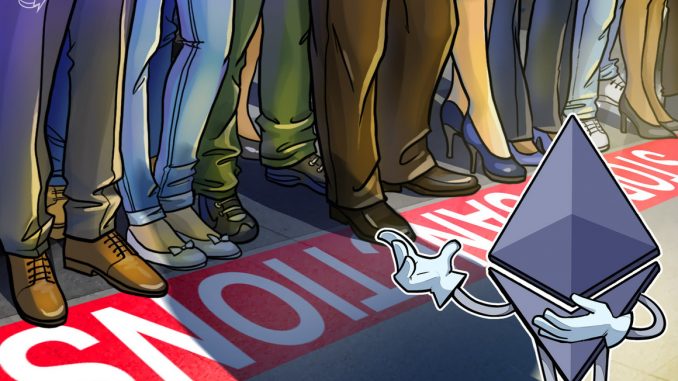
According to the CEO of blockchain development agency Labrys, Lachan Feeney, approximately 45% of all Ethereum blocks currently being validated run MEV-boost relay flashbots and comply with United States sanctions.
Speaking to Cointelegraph in an interview on Sept. 30, Feeney noted that while reports have stated that 25% of all blocks validated since the Merge complies with US sanctions, this is a lagging indicator and the current number is likely to be closer to one out of every two blocks.
Feeney pointed out that MEV-Boost relays are regulated businesses, often U.S. based, and are “censoring certain transactions in the blocks that they build, particularly transactions from Tornado Cash.”
The CEO also pointed out validators have a financial incentive to use MEV-Boost relays, which would drive an uptick in their usage, noting:
“The issue, is that from the validators perspective, these guys are paying them to sort of do this. So if you want to make more money, you just turn this feature on and as a validator, you sort of boost your yield.”
MEV-Boost relays are centralized entities dedicated to efficient Maximal Extractable Value (MEV) extraction. With Flashbots being the most popular, MEV-Boost relays effectively allow validators to outsource block production and sell the right to build a block to the highest bidder.
Labrys released an MEV Watch tool on Sept. 28, which can inform validators about which MEV-Boost relays comply with Office of Foreign Assets Control (OFAC) sanctions. Referring to the motivation behind the tool, Feeney said:
“we’re just trying to raise some awareness for those who are unaware that by running this software, they are potentially contributing to censorship of the network.”
Feeney noted a worst-case situation often referred to as hard censorship, where “nodes would be forced by regulation to basically discard any blocks with any of these transactions in them.”
“That would mean no matter how long you waited, no matter how much you paid, you would never get to a point where those sanctioned transactions would get included in the blockchain,” he explained.
He also pointed out that even in the event of soft censorship, where sanctioned transactions would eventually be validated, it could take hours and require a high priority fee, resulting in a sub-par user experience.
Related: MEV bot earns $1M but loses everything to a hacker an hour later
These findings are reinforced by Ethereum researcher Toni Wahrstätter, who published research on Sept. 28 suggesting that of the 19,436 blocks verified by the Flashbots Mev-Boost Relay, none included a Tornado cash transaction.
Censorship fears were prevalent before The Merge. Speaking to Cointelegraph, the lead investigator for crypto compliance and forensic firm Merkle Science, Coby Moran, suggested the prohibitive cost of becoming a validator could result in the consolidation of validator nodes to the bigger crypto firms — who are much more susceptible to being influenced by government sanctions.





Be the first to comment